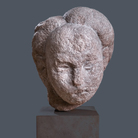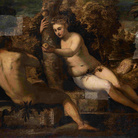Daido Moriyama. In Color

Daido Moriyama. In Color , Milano
Dal 7 November 2015 al 10 January 2016
Milano
Luogo: Galleria Carla Sozzani
Indirizzo: corso Como 10
Orari: tutti i giorni 10.30-19.30; mer e gio 10.30-21
Curatori: Filippo Maggia
Costo del biglietto: ingresso gratuito
Telefono per informazioni: +39 02 653531
E-Mail info: galleria@galleriacarlasozzani.org
Sito ufficiale: http://www.galleriacarlasozzani.org/it
Per la prima volta in Italia un corpus di oltre cento fotografie a colori di Daido Moriyama, il maestro giapponese del bianco e nero. La Galleria Carla Sozzani presenta la mostra Daido Moriyama in Color a cura di Filippo Maggia.
“Il bianco e nero racconta il mio mondo interiore, le emozioni e i sentimenti più profondi che provo ogni giorno camminando per le strade di Tokyo o di altre città, come un vagabondo senza meta. Il colore descrive ciò che incontro senza filtri, e mi piace registrarlo per come si presenta ai miei occhi. Il primo è ricco di contrasti, è aspro, riflette a pieno il mio carattere solitario. Il secondo è gentile, riguardoso, come io mi pongo nei confronti del mondo.”
Hiromichi (Daido) Moriyama, nato a Ikeda, prefettura di Osaka, nel 1938, distingue così la sua produzione fotografica nella videointervista che introduce la mostra.
Apprezzato in tutto il mondo per la sua graffiante, sovente sgranata e sovraesposta, fotografia in bianco e nero, dalla fine degli anni Sessanta è andata imponendosi prima in Giappone e successivamente in ambito internazionale, come il primo vero sguardo rivoluzionario sulla società nipponica. Il 1969 è l'anno in cui Moriyama pubblica sulla rivista Provoke "Eros" il racconto di una notte con un’amante in una stanza d’albergo, e la serie interamente realizzata in un drugstore di Aoyama mentre fuori infuriava la protesta giovanile.
Oggi, a distanza di cinquant'anni Moriyama presenta il suo lavoro a colori alla Galleria Carla Sozzani. Daido Moriyama in Color raccoglie per la prima volta una selezione di 130 fotografie inedite, realizzate tra la fine degli anni Sessanta e i primi anni Ottanta, anni decisivi nei quali si è compiuta la formazione di Moriyama.
La strada, teatro prediletto del fotografo giapponese, è il tema centrale del lavoro di quegli anni, periodo storico particolare per il Giappone che, dopo la ricostruzione e il boom economico successivi alla fine della seconda guerra mondiale, si trovò a vivere e affrontare l’occupazione americana e poi la contestazione studentesca, sull’onda di quanto accadeva in Europa e negli Stati Uniti.
Affascinato dalle esperienze della beat generation e in particolare dalla lettura del capolavoro di Jack Kerouac “Sulla Strada”, il trentenne Moriyama inizia allora il suo solitario e interminabile cammino, un viaggio senza fine raccontato dalle immagini.
Immagini di un Paese che vive in bilico fra tradizione e modernità, di cui Moriyama attraverso fotografie non convenzionali, nei soggetti quanto nella forma - secondo i dettami lanciati da Provoke per cui ciò che conta è “l’esperienza di un momento”- cerca di carpire significativi frammenti di realtà, utilizzando in maniera anarchica la macchina fotografica. I suoi scatti più estremi vennero raccolti nel volume Farewell Photography pubblicato nel 1972. Oltre alla strada, ai vicoli bui e stretti che ancora oggi si celano appena dietro le grandi arterie che attraversano Tokyo, oltre ai locali, che siano essi ryokan, sale di pachinko o night club, ai ritratti di auto e moto americane di grossa cilindrata, agli scatti dei poster di divi americani ed europei, spiccano in mostra i nudi femminili caratterizzati dai colori pop e acidi tipici di quegli anni, ma delicati, ingenui nella loro naturale sensualità.
Daido Moriyama ha esposto in musei e gallerie di tutto il mondo. Fra questi, Tate Modern di Londra, MoMA di San Francisco, Metropolitan Museum di New York, Fotomuseum di Winterthur, Tokyo Metropolitan Art Museum, Fondation Cartier di Parigi.
Accompagna la mostra un volume edito da Skira, con oltre 250 fotografie a colori a cura di Filippo Maggia.
La mostra, realizzata dalla Galleria Carla Sozzani in collaborazione con Fondazione Fotografia Modena, sarà a Modena nel marzo 2016.
“Il bianco e nero racconta il mio mondo interiore, le emozioni e i sentimenti più profondi che provo ogni giorno camminando per le strade di Tokyo o di altre città, come un vagabondo senza meta. Il colore descrive ciò che incontro senza filtri, e mi piace registrarlo per come si presenta ai miei occhi. Il primo è ricco di contrasti, è aspro, riflette a pieno il mio carattere solitario. Il secondo è gentile, riguardoso, come io mi pongo nei confronti del mondo.”
Hiromichi (Daido) Moriyama, nato a Ikeda, prefettura di Osaka, nel 1938, distingue così la sua produzione fotografica nella videointervista che introduce la mostra.
Apprezzato in tutto il mondo per la sua graffiante, sovente sgranata e sovraesposta, fotografia in bianco e nero, dalla fine degli anni Sessanta è andata imponendosi prima in Giappone e successivamente in ambito internazionale, come il primo vero sguardo rivoluzionario sulla società nipponica. Il 1969 è l'anno in cui Moriyama pubblica sulla rivista Provoke "Eros" il racconto di una notte con un’amante in una stanza d’albergo, e la serie interamente realizzata in un drugstore di Aoyama mentre fuori infuriava la protesta giovanile.
Oggi, a distanza di cinquant'anni Moriyama presenta il suo lavoro a colori alla Galleria Carla Sozzani. Daido Moriyama in Color raccoglie per la prima volta una selezione di 130 fotografie inedite, realizzate tra la fine degli anni Sessanta e i primi anni Ottanta, anni decisivi nei quali si è compiuta la formazione di Moriyama.
La strada, teatro prediletto del fotografo giapponese, è il tema centrale del lavoro di quegli anni, periodo storico particolare per il Giappone che, dopo la ricostruzione e il boom economico successivi alla fine della seconda guerra mondiale, si trovò a vivere e affrontare l’occupazione americana e poi la contestazione studentesca, sull’onda di quanto accadeva in Europa e negli Stati Uniti.
Affascinato dalle esperienze della beat generation e in particolare dalla lettura del capolavoro di Jack Kerouac “Sulla Strada”, il trentenne Moriyama inizia allora il suo solitario e interminabile cammino, un viaggio senza fine raccontato dalle immagini.
Immagini di un Paese che vive in bilico fra tradizione e modernità, di cui Moriyama attraverso fotografie non convenzionali, nei soggetti quanto nella forma - secondo i dettami lanciati da Provoke per cui ciò che conta è “l’esperienza di un momento”- cerca di carpire significativi frammenti di realtà, utilizzando in maniera anarchica la macchina fotografica. I suoi scatti più estremi vennero raccolti nel volume Farewell Photography pubblicato nel 1972. Oltre alla strada, ai vicoli bui e stretti che ancora oggi si celano appena dietro le grandi arterie che attraversano Tokyo, oltre ai locali, che siano essi ryokan, sale di pachinko o night club, ai ritratti di auto e moto americane di grossa cilindrata, agli scatti dei poster di divi americani ed europei, spiccano in mostra i nudi femminili caratterizzati dai colori pop e acidi tipici di quegli anni, ma delicati, ingenui nella loro naturale sensualità.
Daido Moriyama ha esposto in musei e gallerie di tutto il mondo. Fra questi, Tate Modern di Londra, MoMA di San Francisco, Metropolitan Museum di New York, Fotomuseum di Winterthur, Tokyo Metropolitan Art Museum, Fondation Cartier di Parigi.
Accompagna la mostra un volume edito da Skira, con oltre 250 fotografie a colori a cura di Filippo Maggia.
La mostra, realizzata dalla Galleria Carla Sozzani in collaborazione con Fondazione Fotografia Modena, sarà a Modena nel marzo 2016.
SCARICA IL COMUNICATO IN PDF
COMMENTI

-
 Dal 20 February 2026 al 19 July 2026
Roma | Mercati di Traiano Museo dei Fori Imperiali
Dal 20 February 2026 al 19 July 2026
Roma | Mercati di Traiano Museo dei Fori Imperiali
Constantin Brâncuși. Le origini dell’Infinito
-
 Dal 18 February 2026 al 19 July 2026
Padova | Centro Culturale Altinate | San Gaetano
Dal 18 February 2026 al 19 July 2026
Padova | Centro Culturale Altinate | San Gaetano
M.C. ESCHER. Tutti i capolavori
-
 Dal 14 February 2026 al 31 May 2026
Parma | Palazzo Tarasconi
Dal 14 February 2026 al 31 May 2026
Parma | Palazzo Tarasconi
Impressionisti: 100 anni di riflessi. Gli Impressionisti da Monet a Bonnard
-
 Dal 14 February 2026 al 16 April 2026
Ancona | Pinacoteca Civica Francesco Podesti
Dal 14 February 2026 al 16 April 2026
Ancona | Pinacoteca Civica Francesco Podesti
TIZIANO VECELLIO E LORENZO LOTTO. Due capolavori del Rinascimento alla Pinacoteca Civica di Ancona per due mostre studio
-
 Dal 12 February 2026 al 14 June 2026
Roma | Galleria Nazionale d’Arte Antica in Palazzo Barberini
Dal 12 February 2026 al 14 June 2026
Roma | Galleria Nazionale d’Arte Antica in Palazzo Barberini
BERNINI E I BARBERINI
-
 Dal 11 February 2026 al 7 June 2026
Venezia | Gallerie dell’Accademia
Dal 11 February 2026 al 7 June 2026
Venezia | Gallerie dell’Accademia
Tintoretto racconta la genesi. Ricerca, analisi e restauro


